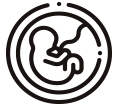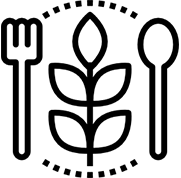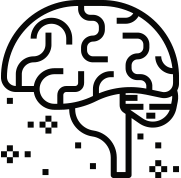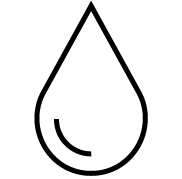Vitamins and Supplements Test
Vitamins and Supplements Test is a genetic test that allows you to know in a personalized way the vitamins and supplements that will help you feel better in your daily activities.
From the analysis of your genetic variants, we prepare an accurate and personalized results report, on the supplements and vitamins that are best adapted to your body so that you can start a personalized supplementation plan.
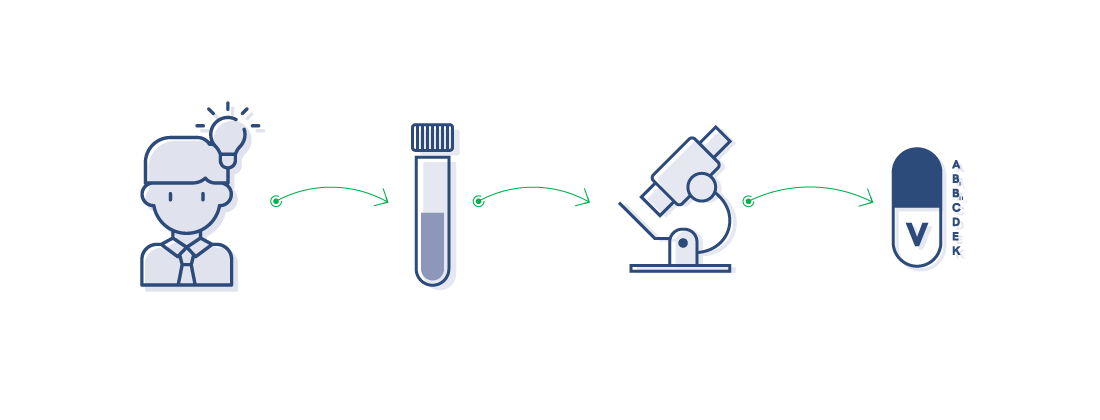
For whom
The genetic test of Vitamins and Supplements is indicated for all the people who wish to know the state of their organism and start with a personalized supplementation plan.
In this test, the most popular supplements and vitamins have been considered and have been grouped according to the physiological processes they regulate.
Profits
The analysis of genetic variants allows providing information on:
- Energy contribution.
- Cholesterol and triglycerides.
- Control of appetite and satiety.
- Antioxidant effect.
- Fat metabolization.
- Prevention of inflammation.
- Injury prevention.
- Regulation of folate and vitamin B12 levels.
- Sleep regulation.
- Vasodilation.
Supplementation
It consists of the contribution of complementary nutritional substances to our diet to maintain good health.
In addition, it will help you:
- Feel better and achieve your desired goals.
- Identify deficiencies marked by genetics.
- Maximize athletic performance.
- Take supplements and vitamins optimally and effectively.
- Prevent the appearance of injuries and strengthen weaknesses.
Notice: The information in this report is clinical in nature and should not be considered medical advice. Supplementation should not be used in any case as a substitute for any of the meals in our daily diet.
- 290€
- Sample: Blood
- Delivery: 22 working days
![]()
FAQs
Dietary supplements are products designed to complement the diet, among them we find minerals, vitamins, enzymes, fatty acids and amino acids. In addition, vitamins are a group of compounds necessary for life, as they are essential for proper cell function, growth, and development.
In addition, they provide the nutrients that our body uses at specific times, either because they are not being consumed in sufficient quantity or because the body has increased its demand. The minimum daily requirements for vitamins are not very high and depend on your age, gender and other factors such as health.
It is important to have an adequate intake since both the deficit and the excess of vitamins can cause mild or even serious diseases.
Vitamin supplementation helps with:
- Prevention of inflammation.
- Injury prevention.
- Regulation of folate and vitamin B12 levels.
- Sleep regulation.
- Vasodilation.
Supplementation consists of the contribution of complementary nutritional substances to our diet to maintain good health.
In addition, with a personalized vitamin supplementation plan you will achieve:
- Feel better and achieve your desired goals.
- Identify deficiencies marked by genetics.
- Maximize athletic performance.
- Take supplements and vitamins optimally and effectively.
- Prevent the appearance of injuries and strengthen weaknesses.
1. Vitamin B1 (Thiamine): Vitamin B1 or thiamine is one of the B complex vitamins. These are water-soluble vitamins that participate in a multitude of chemical reactions in the body. Specifically, this vitamin helps the body's cells convert consumed carbohydrates into energy, influencing the growth, development and function of cells.
2. Vitamin B2 (Riboflavin): Vitamin B2 or riboflavin, is water soluble, which means that it is not stored in the body. Riboflavin deficiency can affect the antioxidant system regulated by glutathione (GSH) and lead to increased cellular oxidation.
3. Vitamin B3 (Niacin): Vitamin B3 or niacin is a water-soluble vitamin, that is, soluble in water. It is not stored in the body and surpluses are eliminated in the urine. Niacin helps the functioning of the digestive system, skin and nerves. It is also important to transform food into energy.
4. Vitamin B9 (Folate): Vitamin B9, also known as folate, is a water-soluble vitamin, which functions as a coenzyme in the synthesis of nucleic acids and in the metabolism of amino acids. Folate is involved in one of the DNA formation reactions and therefore its deficiency can lead to the appearance of megaloblastic anemia.
5. Vitamin B12: Vitamin B12 or cobalamin is a nutrient that helps maintain healthy neurons and the correct production of red blood cells. In addition, it contributes to the synthesis of DNA, the genetic material present in all cells.
6. Vitamin C: Vitamin C (ascorbic acid) is an essential water-soluble vitamin necessary for normal growth and development of the body. In the body, it acts as an antioxidant, helping to protect cells against damage caused by free radicals. Its continuous intake is recommended since it is easily eliminated from the body.
8. Conjugated Linoleic Acid (CLA): Conjugated linoleic acid is a type of fat that reduces the formation of fatty tissue and enhances its degradation, leading to a reduction in body fat.
9. Ursolic acid: Ursolic acid is a compound that promotes heat production by burning fat.
10. Amylopectin: Amylopectin supplements are carbohydrates that provide extra energy for the body. In addition, it is beneficial in physical recovery after exercise.
11. ‘’ Branched chain amino acids ”:
• Leucine plays an important role in muscle synthesis during physical exercise and strengthens the immune system.
• Isoleucine contributes to muscle protein synthesis and promotes muscle recovery avoiding fatigue.
• Valine promotes tissue healing.
12. Caffeine: Caffeine is a stimulant that can increase energy levels. In addition, caffeine has antioxidant properties since it is capable of eliminating oxygen radicals.
13. Catechins: Catechins have a great capacity to neutralize toxic substances produced by the body and avoid harmful effects that they have on health.
14. Chitosan: Chitosan is a fiber that promotes the feeling of satiety.
15. Coenzyme Q10: CoQ10 participates in the process of cellular respiration.
16. Chondroitin: It is involved in the formation of cartilage around the joints and is often used for osteoarthritis or predispositions to breakage of the joints, as it could delay them.
17. Curcumin: Curcuminoids increase the activity of some crucial enzymes for redox balance and reduce the oxidation of lipids present in the blood (which has a protective effect at the cardiovascular level).
18. Spirulina: Spirulina is a capable algae that provides minerals, vitamins and proteins of great nutritional value for the body. In addition, it helps control body mass index and weight.
19. Fucoxanthin: Fucoxanthin is capable of increasing the proportion of brown fat, which leads to increased thermogenesis.
20. Garcinia cambogia: Garcinia cambogia is an Indian fruit rich in hydroxycitric acid (HCA), which is credited with the ability to decrease appetite.
21. Genistein: Genistein is an antioxidant present in soybeans that has the ability to capture free radicals.
22. Glucomannan: Glucomannan is a very soluble fiber capable of capturing water, providing a feeling of satiety.
23. Glucose: Glucose, colloquially known as "sugar". Sugar is the main source of energy, transported through the blood to all cells in the body.
24. Glucosamine: Glucosamine sulfate is a natural substance present in the body and is very effective in the rehabilitation process of injuries (tendons, ligaments, cartilage and the fluid that surrounds the joints).
25. Glutamine: It is used as a supplement since its use during training helps to increase the rate of protein synthesis, prevents the breakdown of muscle proteins, helps to regenerate muscle fiber injuries, increases contraction and therefore muscle growth.
Others
26. HMB: HMB is a naturally occurring metabolite used as a supplement as it produces beneficial effects on muscle recovery.
27. Irvingia gabonensis: Irvingia gabonensis, or African mango, is a fruit native to West Africa with high nutritional value, rich in protein and fiber.
28. L-Arginine: One of the characteristics of this amino acid is that it is involved in the dilation of blood vessels, thus improving blood flow and supply of nutrients.
29. L-Carnitine: Carnitine is a molecule involved in fat metabolism, responsible for the transfer of long-chain fatty acids into the mitochondria, where their oxidation occurs.
30. L-Citrulline: L-citrulline is a non-essential amino acid, it has the ability to produce various effects that improve physical performance.
31. Lysine: Lysine is an essential amino acid, so it is necessary to incorporate it into the diet to avoid deficiencies or deficiencies. Lysine is incorporated into collagen to give it consistency, in addition, it is involved in protein synthesis, intestinal calcium absorption and is a precursor of L-carnitine.
32. L-Tyrosine: Tyrosine is a non-essential amino acid responsible for stimulating the production and release of hormones such as epinephrine, norepinephrine, and catecholamines.
33. L-Tryptophan: L-Tryptophan is an essential amino acid (the body cannot synthesize it), a precursor of serotonin, melatonin and vitamin B6 (nicotinamide). It is involved in the regulation of mood, sleep, and a general state of well-being, as it can decrease the amount of time it takes to fall asleep.
34. Magnesium: Magnesium is an essential mineral for the diet, which influences the nervous system, muscle relaxation and protein formation. It prevents muscle damage and joint injuries, in addition, it helps in the repair of ligaments and tendons.
35. Maltodextrin: Common in sports nutrition for its energy supply capacity. This has the great advantage of not producing digestive discomfort compared to the contributions of simple sugar in large quantities.
36. Melatonin: Melatonin is a hormone present in the body that is involved in the natural sleep cycle. Melatonin can reduce the time it takes to fall asleep, increase total sleep time, and improve sleep quality.
37. Methylsulfonylmethane: Methylsulfonylmethane (MSM) is a chemical that has been shown to be effective against arthritis, an inflammatory disease characterized by joint pain, swelling, stiffness, and redness.
38. Creatine Monohydrate: Creatine is commonly used for enhancing physical performance and increasing muscle mass in athletes and older adults. It should be noted that in combination with carbohydrates it can further increase creatine levels in the muscles.
39. Organic Nitrates: Nitrate is a precursor to nitric oxide (NO), which performs many functions in the human body, from the regulation of neurotransmission, immunity and vascular control, to alterations in oxygen consumption.
40. Omega 3: Omega-3 fatty acids are a type of polyunsaturated fat essential at any stage of life in humans, essential for the correct functioning of a large part of the biochemical processes. These fatty acids participate in the modulation of the immune response, showing an anti-inflammatory and cytoprotective effect (protection of the mucosa).
41. Chromium Picolinate: Chromium is a mineral necessary to regulate blood sugar levels and eliminate body fat. However, its assimilation into the body is quite low.
42. Proline: Proline is a non-essential amino acid, whose main function in the body is the production of collagen, related to the repair and maintenance of tendons and ligaments, essential for the osteoarticular system.
43. Protein: It is responsible for hunger, since it sends signals to the brain indicating that it needs to eat and increasing the sensation of appetite.
44. Quercetin: Quercetin is a flavonoid, a natural antioxidant with very beneficial effects on the body as it sequesters the oxygen radical and reduces the negative consequences that free radicals have on our cellular system.
45. Zinc: Zinc is considered one of the most important elements for nutrition in humans, since it plays an important role in metabolic processes such as the synthesis, storage and secretion of insulin, as well as in the action of leptin (sensation satiety).

